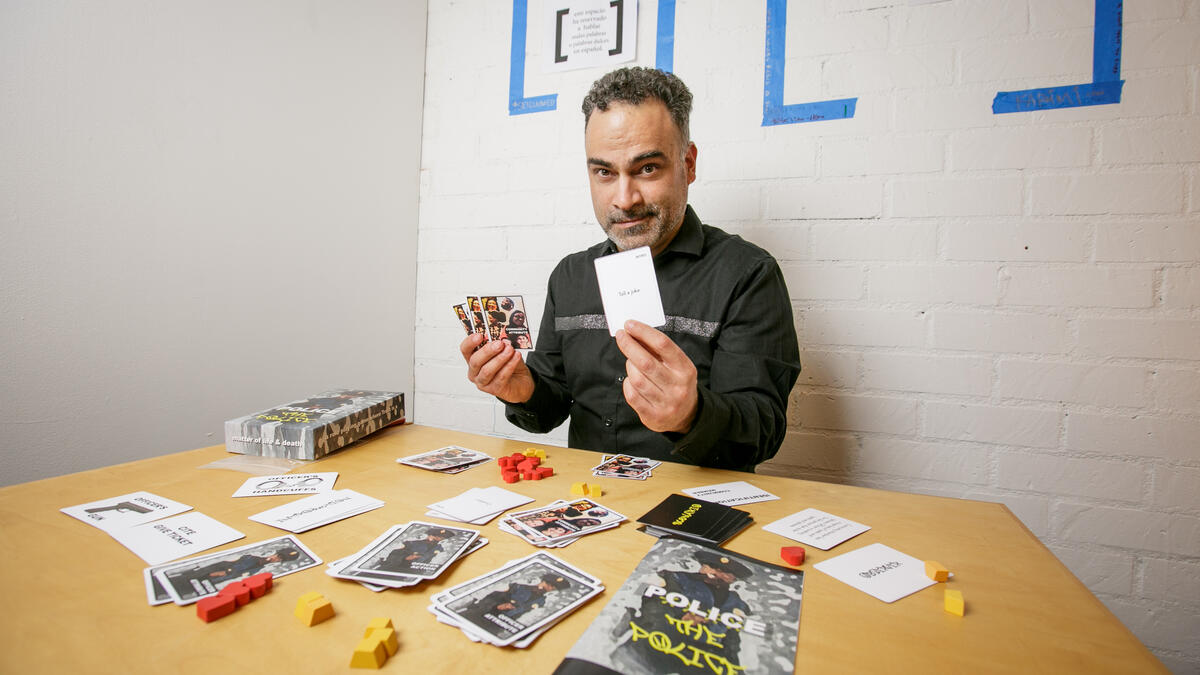Robert Farid Karimi wants to amplify the ways people tell stories, and as a new assistant professor in Arizona State University's School of Music, Dance and Theatre, Karimi hopes to do that through theater.
Karimi, who uses gender-neutral pronouns, has 25 years of experience as a creative developer and comedic storyteller, some of which were spent working with ASU on groundbreaking projects. A graduate of UCLA with an MFA from the USC Roski School of Art and Design, Karimi created programs in high schools in Chicago and Minneapolis and has worked with performers all over the world.
Karimi worked for corporate clients like HBO (Def Poetry Jam), General Mills and the Kresge Foundation. They bring food, comedy and interactive storytelling to events as small as 25 and as large as 5,000. They also design game-performances, interactive immersive theater experiences and themed entertainment to engage players to share stories and discuss social issues that concern the various communities they visit.
“Teaching art, design, games, theater and performance is a part of my artistic practice,” Karimi said. “I think about how to engage people. Theater is the language I first used to think about that engagement.”
As a touring solo performer and spoken-word artist, Karimi was not only asked to perform, but also to attend workshops where they would share ideas, dialogue and all that encompasses acting beyond just skills.
“It made me think about theater as part of the life journey and how theater can be an asset to us no matter what path we take.”
This fall, Karimi is teaching Acting I to theater students and plans on wearing all of the hats they feel a theater professor should wear.
“At a point you realize you are not only teaching them to be on stage, you are also teaching them to be in front of a camera, and how to publicly speak, etc. How to bridge their various lives.”
Karimi hopes to bring this spirit and to “be a spark to someone.”
“We are so pleased that Robert Farid Karimi has joined us,” said Heather Landes, director of the ASU School of Music, Dance and Theatre. “Karimi’s 25 years of experience as a creative storyteller and actor and their work engaging community in conversations addressing social issues through interactive experiences aligns well with ASU’s mission of responsibility for the economic, social, cultural and overall health of the communities we serve.”
Karimi was first invited to teach as a guest artist at ASU to engage communities with their Creative Capital supported work, The Peoples Cook Project. The culinary engagement project combines humor, cross-cultural exchange and food where participants’ stories, recipes and cultures are the focus of artistic nourishment. As the revolutionary cook Mero Cocinero, Karimi’s alter-ego for the project, Karimi has cooked for such luminaries as DJ Peanut Butter Wolf, poet Jose Montoya, Yuri Kochiyama, Michele Serros and hip-hop superstar MF Doom, as well as for over 60,000 people in the last 11 years.
In 2012, with a team of researchers from the Herberger Institute of Design and the Arts and the School of Nutrition and Health Promotion, Karimi focused on the relationship between creativity, theatrical performance and changes in dietary attitudes and beliefs. They worked with nutrition students and health workers to see if creative activities enhance nutrition education skills. PBS produced a short documentary on their residency at ASU.
Before the pandemic, Karimi was working on a board game examining police brutality and had planned to produce and direct “Swimming Pool Party,” an interactive game-performance they premiered in Los Angeles in 2019. It takes place in a futuristic land where people are separated by those who can swim and those who cannot. The premise: to get audiences focused on the inequitable amount of communities of color that do not know how to swim. They still hope to attempt this project virtually, seeing the roadblocks as an opportunity rather than a hindrance.
Karimi hopes to continue their work on interdisciplinary game-performance and playfulness in socially engaged art, and shares that they would “also like to introduce the campus to a group of interdisciplinary cross-cultural thinkers, performers and doers that use the theater vocabulary to create their work and create global social change.”
More Arts, humanities and education

Award-winning playwright shares her scriptwriting process with ASU students
Actions speak louder than words. That’s why award-winning playwright Y York is workshopping her latest play, "Becoming…

Exceeding great expectations in downtown Mesa
Anyone visiting downtown Mesa over the past couple of years has a lot to rave about: The bevy of restaurants, unique local shops…

Upcoming exhibition brings experimental art and more to the West Valley campus
Ask Tra Bouscaren how he got into art and his answer is simple.“Art saved my life when I was 19,” he says. “I was in a…


